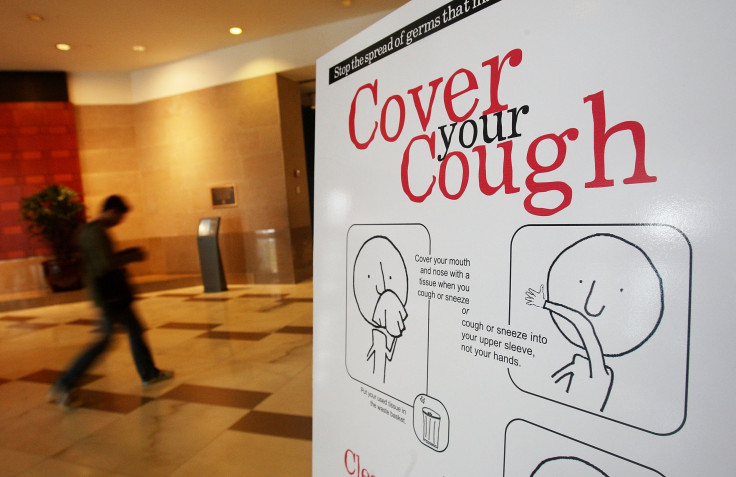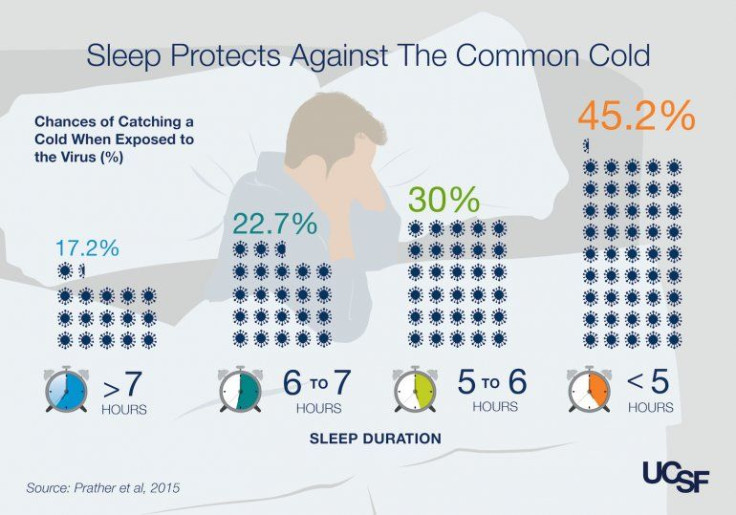Common Cold Season 2015: Sleep, Chicken Soup And All Things That May Or May Not Work

Fall is approaching, and that means cold season is right around the corner. There will be many articles shared on Facebook about the best ways to avoid getting sick. Not all of it is true, and sifting through the scads of information can be overwhelming. Here's our guide to what to believe and what to ignore among cold-prevention prescriptives.
The Power Of Sleep
Any time you hear something about sleep, please listen to the advice. A good night's sleep can improve your mood, help you live longer and improve your immune system. Researchers from the University of California, San Francisco; Carnegie Mellon University; and the University of Pittsburgh Medical Center measured how sleep affects your risk of catching a cold. Seven seems to be the magic number when it comes to how many hours you need each night. Individuals who slept six hours or less were four times more likely to get sick than participants who slept at least seven hours.

"It didn't matter how old people were, their stress levels, their race, education or income. It didn't matter if they were a smoker. With all those things taken into account, statistically sleep still carried the day," lead author Aric Prather, assistant professor of psychiatry at UC San Francisco, said in a statement. The study was published in the journal Sleep.
Keeping Warm And Covering Your Nose
The cold weather affects your chance of getting a cold, but that has less to do with the rhinovirus -- the agent responsible for the common cold -- and more to do with your immune system. Yale University researchers determined the immune system was slower to respond to the virus. Previous research showed the rhinovirus replicated faster in lower temperatures, but this was the first study to evaluate the immune system's response to the virus in lower temperatures. "In other words ... the research may give credence to the old wives’ tale that people should keep warm, and even cover their noses, to avoid catching colds," Yale wrote.
Hygiene And Avoiding Crowds
If you've ever been stuck on a crowded train during rush hour, you know you can't escape every sneeze from a stranger. We're also going to touch something, somewhere that someone with a cold has touched. During cold season, the Centers for Disease Control and Prevention recommends washing your hands with soap and water to reduce the risk of catching a cold. An alcohol-based hand sanitizer also will work. Hygiene is important, so make sure to throw away tissues, disinfect surfaces and cover your nose and mouth when you sneeze or cough. Try to avoid people who are sick and don't come to work when you have a cold.
Chicken Soup And Other 'Remedies'
Chicken soup may be a good way to battle a cold or upper respiratory infection. Dr. Stephen Rennard, from the University of Nebraska Medical Center, researched the popular home remedy and determined it may have anti-inflammatory properties. Chicken soup is certainly delicious and the potential health benefit is an added bonus. The homeopathic remedies Zicam and Airborne do not work. The two products have come under scrutiny by the Food and Drug Administration -- the latter losing a $23 million class-action lawsuit -- and feature disclaimers saying they are not intended to cure any disease.
© Copyright IBTimes 2024. All rights reserved.





















